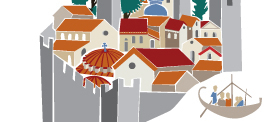Birth
The
birth
of
a
child, especially
if
it
was
a
boy, brought
great
joy
to
the
byzantine
family, consummating
thus the marriage. If
a
couple
could
not
bear
a
child
the
fact was perceived as a result of divine punishment.
The
birth
during
those
years, although
a
totally
normal
phenomenon, put
both
the
woman
and
the
child
involved
in
great
risk. Perhaps
this
is
why
the
parturient, shortly
before
giving
birth, used
to
confess
and
receive
communion, while
in
the
same
time
seeking
help
from
clairvoyants
and astrologers.
Women usually deliver the baby at
home, with the help of a midwife. A doctor was called in only in case of
complications in order to save the life of the woman or the baby. The women used
to give birth lying on a bed, as it is done nowadays, sitting on a stool or
even standing in an upright position supported by the shoulders of other women.
The
duties
of the midwife
contained
the cut
of
both the
placenta
and
the
umbilical
cord of the baby, the checking of its
physical
integrity
and
senses,
as well as the washing of the baby in warm salted water and the wrapping of its
body with fabric strips (infancy) to keep it warm and protected. In byzantine
times the period of the postpartum lasted seven days.
During this time woman was
considered to be infected until the fortieth day after birth when she was
completely cleaned.
In order for
the
woman
to recuperate
and
to
produce
enough
milk
to
nurture
her
baby
she followed a special diet, containing a lot of fluids, eggs and the so-called
“lochozema”, which was either wine mixed with sugar and lime pieces or baked
semolina with honey and butter.
Similar customs were followed
when a prince was born. When
the
successor
of
the
throne
was
born, messengers
were sent all over the empire to notify the thrilling news. The
citizens
of
the
Byzantium
used
to
send
their
gifts
depending
of the sex of the newborn. Symposia, festivals and horse races where the name
of the baby was revealed, were organized to mark the happy event. The feasts
and celebrations of the royal family and their citizens on the birth of a male
successor could last six months or even a year.
Glossary (1)
parturient:
about to give birth.
Information Texts (0)
Bibliography (6)
1. Congourdeau, M.H., Regards sur l’ enfant mouveu-ne a Byzance, 1993
2. Κουκουλές Φ., Βυζαντινών Βίος και Πολιτισμός, Παπαζήση, Athens, 1954
3. Πουλάκου- Ρεμπελάκου, Ε., Το παιδί και η υγεία του στη Βυζαντινή εποχή, 2007
4. Pitarakis, B., ‘The Material Culture of Childhood in Byzantium’ in Becoming Byzantine: Children and Childhood in Byzantium, Papacostantinou, A.Talbot, A.M., Washington D.C., 2009
5. ‘Ο κύκλος της ζωής στα έθιμα των Βυζαντινών’ in Ψηφίδες του Βυζαντίου
6. e-istoria.com - Βυζάντιο, http://www.e-istoria.com/66.html
Comments (0)





